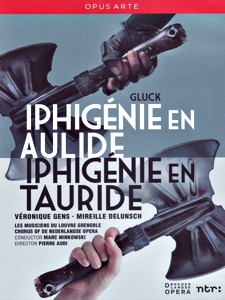De Nederlandse Opera’s remarkable 2011 feat of premiering productions of Gluck’s Iphigénie en Aulide and Iphigénie en Tauride on the same day and virtually the same set has been issued on a 2-DVD set by Opus Arte
. Both productions feature fine singing, cogent and interesting stage direction, and brilliant conducting; both use period instruments and period pitch, much to the singers’ advantage. The performances on these DVDs are splendid and Gluck’s use of mythological stories to reflect deeply human emotion is brilliantly served.
Conductor Marc Minkowski seems to have Gluck’s music in his bones—in both operas, he leads Les Musiciens du Louvre Grenoble in a seamless and sensitive reading, creating subtle emotional landscapes combined with a grace and stateliness. Gluck’s 1774 and 1779 scores seem much closer to their 19th century counterparts than they do as reflections of music gone before. The clarity of dramatic representation in Gluck’s work is achieved by abandoning Baroque ornamentation and customs, and Minkowski makes a splendid case for a cogent blend of music serving to underpin the drama. The mythical characters are presented as three- dimensional human beings, gallant yet flawed. The Gods (here personified by the goddess Diana) are shown as just, but with a cold and cruel streak, demanding constant sacrifices.
The operas share Pierre Audi‘s direction, setting both in a modern-ish military camp style, on a very simple but effective set by Michael Simon. Sets of metal stairs lead down to a central platform where much of the action takes place. The stairs are surrounded by metal scaffolding pieces set at odd angles. Anna Eiermann’s costumes lean heavily toward camouflage gear in Aulide, with even Clytemenestra wearing a gown made of camouflage print. In Tauride, Iphigénie and her fellow priestesses wear simple white shifts while the Scythian guards continue the military motif.
In Aulide, Agamemnon is faced with the terrible choice of sacrificing his daughter Iphigénie to the goddess Diane (offended because the Greeks have killed a doe in her personal wildlife preserve, though in this production they are dead gulls, perhaps a Chekhov allusion?) or failing to get the prevailing winds to get his army to Troy. Iphigénie arrives, believing she is to be married to Achilles, and faces the horror of her possible sacrifice with equanimity (and attached to a terrorist suicide belt). Mother Clytemenestra pleads for her, as does Achilles, and at last Diana relents when she sees Iphigénie’s willingness to die for her family and country.
Fifteen years later, we’re in Tauride, with Iphigénie a priestess to Diana who is required to sacrifice any strangers who happen to appear on the island and under the thumb of the barbarous Scythians and their tyrannical king, Thoas. Oreste and his rather homoerotic pal Pylade soon wash up, are captured, and prepared for sacrifice. Iphigénie fails to recognize Orestes (in the space between the two operas, the events of Strauss’ Elektra have taken place and entered Iphigénie’s dreams) and prepares to kill him, then there is the moment of sudden recognition that they are brother and sister. Diana intervenes as Pylades kills Thoas, and the Greeks are restored to their former happiness.
The rarely performed Iphigénie en Aulide was a very pleasant surprise. There are a variety of dramatic and musical scenes, with expressions of joy and love interspersed with the underlying tension over the possibility of sacrifice. Clytemenestra has three very fine arias, splendidly sung and acted by Anne Sofie von Otter; Veronique Gens in the title role brings tonal beauty and a variety of emotions sung with grace and and excellent stage presence. Gens sings with sensual sweetness in her duets with Frederic Antoun’s ardent and gutsy Achille. Nicholas Teste is a stentorian but underpowered Agamemnon, and Christian Helmer brings an interesting oiliness to the high priest Calchas. Director Audi has achieved an excellent sense of ensemble in this cast, with all the singers intent on telling the story rather than showing off their vocal pyrotechnics.
The more stately and dark music of Iphigénie en Tauride begins with an overture of violent storm music, but soon settles into a quiet, brooding mode as an increasingly unhappy Iphigénie continues her role in sacrificing strangers to Diane. Again in this opera, conductor Minkowski produces sounds of ethereal beauty, almost painfully so, perfectly reflecting the emotional state of Iphigénie, Oreste, and Pylade. Soprano Mireille Delunsch manages the tricky title role with aplomb, and one does not miss the usual mezzo voice in the role. Delunsch has a lush and expressive sound, sensitive to text and emotional clarity. There is fine singing also from Jean-Francois Lapointe as Oreste and Yann Beuron as his longtime companion Pylade, but Audi chooses not to specify the nature of their relationship. We are left with a “friendship love” between them, rather similar to the Antonio-Sebastian relationship in Shakespeare’s Twelfth Night. Still, both singers are passionate and fearless as they desperately try to save each other from sacrifice.Salome Haller is the imperious goddess Diane in both operas, and she brings a regal bearing and strength to all her appearances. The one directorial misstep here comes when hunky baritone Laurent Alvaro as Thoas (he was a shirtless, gold-tinged Arcas in the first opera) pulls a knife and seems to be threatening Iphigénie with rape (or at least a bit of S&M). Audi never makes this clear, but seems to be implying that Iphigénie is not altogether unhappy about Thoas’ advances. It’s just a needless “red herring” that pulls attention away from the storytelling.
Gluck occasionally suffers the bad rap of being boring or turgid. These performances will disabuse any of that notion. The full-blooded drama offered in these performances is a major change from the excesses of the baroque operas that came before. Gluck’s musical and dramatic advances are very well served by these excellent productions and in particular by Minkowski’s masterful conducting.




